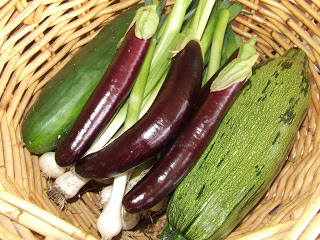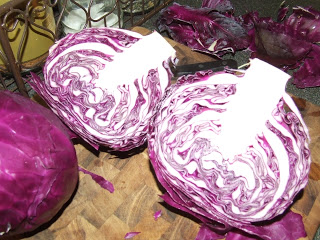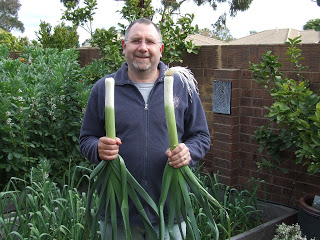Okay, I know there is no such thing as an ‘almost vegetarian’. That is a bit like saying just a little bit carnivorous, or half an omnivore!
So this post is an update for the goal I set at the start of the year, “Reduce our meat intake by 80%”. Well one thing for sure, eating mostly a vegetarian diet is a lot easier than I thought it would be. Since a week before New Year, we are down to just 2 meals a week with meat on average, with Kim a little more, and me a little less. Even Ben is joining in, sometimes.
Let me give you an example of our daily meals;
Breakfast: Boiled eggs and toast for Kim and Ben, with Porridge and fruit from me
Lunch: Is usually a hearty curried bean soup (one of Kim’s specialtys) with either crackers or home baked bread or a green salad with feta and olives, or a big salad sandwich with cheese.
Dinner is varied. Sometimes veggie burgers, sometimes a meat substitute (Fry’s Vegetarian and Sanitarium Vegie Delights range both have a great selection that tastes nice) with steamed or roasted veg, sometimes pasta with a homemade sauce, or even one of my favourites, Lentil and Mushroom Bourguignon. Then some fruit or icecream for desert, and some raw mixed nuts for afters. We often substitute red meat with lentils and beans, and find the same meals that we usually make (sans meat) to be very nice. We use lots of herbs and spices to flavour our food, and I have not had a bland meal yet. I am very satisfied with our diet so far, and do not feel lacking in energy or motivation. That said, in the first week or two I felt a little blah, but after all of the crap was flushed out of my system, and I cut down to one coffee a day, I feel great. No stomach or intestinal issues (which I usually get about twice a month), and am now regular as clockwork (I know, too much information).
We have regular snacks which consists mainly of fruit, nuts, cheese and crackers, and raw veg or dips.
So the meat meals that we have had, the proportion of meat has been minuscule compared to what we used to eat. For instance, Kim made an egg and bacon pie last week, but there was only a smidgen of bacon (biodynamic) in it, but the flavour as fine.
Vitamin A Green leafy vegetables, yellow/orange vegetables and fruit.
Vitamin B2 (riboflavin) Fortified breakfast cereals and soya drinks and almonds.
Vitamin D Exposure to sunglight, fortified breakfast cereals, vegetable margarines. Kim takes a vitamin supplement as she has trouble with vitamin D.
Calcium Fortified soy beverages, sesame seeds, fortified fruit juice, broccoli, green leafy vegetables, tofu, beans and pulses, or even calcium supplements.
Zinc Tofu, legumes, peas, nuts, seeds, wholegrain cereals and wholemeal bread.
Iron Fortified breakfast cereals, wholemeal bread, dried fruit, green leafy vegetables, beans and pulses, molasses, nuts and seeds, tofu.
Selenium Brazil nuts, sunflower seeds, molasses, wholemeal bread.
Iodine Iodised salt, seaweed.
Protein Soy products, legumes, lentils, nuts, seeds, wholegrains.
Overall we have a really balanced diet, with everything in moderation. I like this particular Michael Pollan quote that he mentions in the documentary Food Inc.:
“Eat food. Not too much. Mostly plants.” ― Michael Pollan, In Defense of Food: An Eater’s Manifesto
So why are we doing this? Well the obvious one is to drastically lower our carbon footprint by reducing food miles, and eating locally, however the other main reason is one of health. Choice magazine has this to say about the health benefits of a mostly vegetarian diet;
“Vegetarian diets are generally higher in fibre and lower in fat and cholesterol. There is growing evidence that vegetarians are less likely to suffer from cancer, heart disease, strokes and have a longer life expectancy. People who choose a vegetarian diet for health reasons are also likely to have other healthy practices: such as exercising regularly, not smoking, or abusing drugs or alcohol.”




I see where you are coming from! After trying vegetarian a number of times through my life, I had to admit defeat – my body just didn’t like it! I am now eating primal and my body loves it – do as the humans did for thousands and thousands of years and I am reaping the benefits! I have to say paleo (or primal) is working for me – more vegies, more fruit, but much less bread and the like…
For the past 2 years I’ve been a committed vegetarian…my blood pressure dropped, my weight dropped and I feel younger! So bravo to you and your family!
Hi Gavin,
The other benefit speaking from experience is vegetarianism works much better for people with MS. When I was diagnosed my neurologist actually convinced me to go vegan and follow George Jelinek’s diet and I have only had one attack since and my neuropathy in my hands and feet improved ten fold.
Admittedly I’m only in my early 30’s and had only been having attacks for 18 months.
But I havent felt this fantastic in years!!
Cheers 🙂
Hi Gavin, that’s pretty much the way we eat. A lot of vegetables, herbs, lentils, nuts and fruit, mostly home grown, a bit of grains, mostly whole grain, a bit of dairy, mostly low fat, and occasionally a little bit of red meat, mostly kangaroo, or fish, mostly caught by my mad keen fisherman partner or MSC certified (or canned salmon – not tuna), or chicken, mostly home-grown. I think there’s a lot to be said from an environmental, health, ethical, financial, and gourmet viewpoint for the “almost vegetarian” diet.
mmm how timely! I am currently reading “the china study” by Colin Campbell. His research shows that the more affluent countries eat way too much protein and this in turn relates to more diseases. I always try to veer towards a more plant based diet, but it is hard to get the hubby on track with that! I keep persisting though. I think you are on the right track. Thanks for all the info you share.
I was vegetarian for over 20 years. Recently I have started eating some meat and fish (including shellfish and crustaceans). My rule for meat and fish is simple, I will only eat it if I, or someone I know and trust has caught and killed it. What started me on this path was thinking about where my tofu came from, was it manufactured from soya grown on ex-forest land in Brazil? Was it lower impact to eat rabbits or fish or crabs which are abundant locally (I live in Shetland in the UK)? So I am trying to live a bit more bioregionally, with growing veg, some foraging and fishing and a bit of hunting, using primitive technology such as handline, net, bow as I think this is a bit more humbling and I don’t like the “king of the wild” attitude I have seen from some gun users. There are some excellent books out there on Primitive Living and Paleoplanet on Yuku is a very good site for skills.